Thanks to Our Volunteers! – November 2024 Community Wildlife Chapter Updates
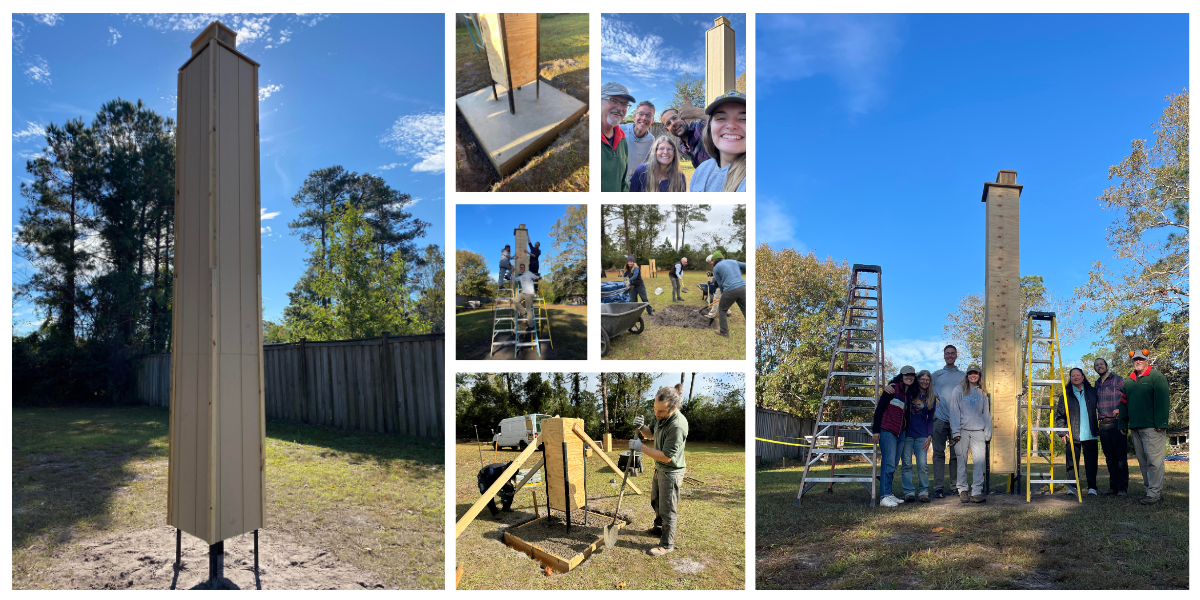
North Carolina Wildlife Federation staff and Community Wildlife Chapter volunteers were in full swing throughout the month of November, they did a whole lot of webinar hosting, engaging kids in nature, wildlife watching, native planting and litter pickups. In November, over 280 people were given the opportunity to connect with nature through one of NCWF’s opportunities. This month throughout our great state, 138 native trees and shrubs were installed, and 105 native pollinator plants were planted. Over 17,000 pounds of debris were removed from waterways and riparian habitat by NCWF Community Wildlife Chapters and partners.
Thanks to partners such as the Duke Energy Foundation, Jandy Ammons Foundation, Albemarle-Pamlico National Estuary Partnership and Burt’s Bees for helping make these habitat restoration workdays, educational programs and nature outings possible. Explore our Events Calendar to discover where NCWF and our Community Wildlife Chapters are hosting in-person and virtual events near you. Check out a few highlights below from our conservation outreach team.
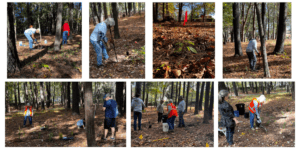
November 2, NRHC Native Planting Workday at Main Street Park: NCWF Neuse River Hawks Conservationists Chapter held a native planting workday at Main Street Park in Rolesville. Thirty eight volunteers helped plant and water 429 native trees, shrubs, and pollinator plants. After multiple invasive removal workdays to remove privet, Japanese stiltgrass, and English ivy that had taken over the park, the chapter was finally able to add plants such as American beautyberry, pawpaw, swamp sunflower, and white-topped sedge that will benefit local wildlife.
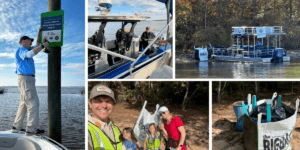
November 2, Hurricane Helene Cleanup: NCWF Lake Norman Wildlife Conservation Chapter completed its second major lake cleanup in response to Hurricane Helene. Volunteers and boat captains deployed from two separate access areas and removed over 15,000 lbs of trash and debris with the help of over 30 volunteers, 7 boats, and heavy equipment from Lancaster Custom Dock and Lift. Volunteers even took the time to inspect osprey platforms for damage and to fasten Duke Energy & NCWF Habitat Enhancement Program informational signs to the poles.
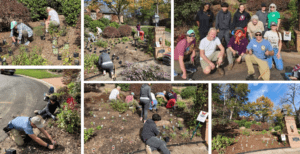
November 3, Butterfly Highway Pollinator Planting: NCWF Charlotte Wildlife Stewards Chapter installed a Pollinator Pitstop along the Butterfly Highway. This pollinator project was made possible by funds raised from Wild on the Water, CWS’s annual fundraiser for wildlife. Ten enthusiastic volunteers showed up to plant 89 plants representing 13 plant genera and 15 species! Plants such as milkweed, aster, cardinal flower, and blue-eyed grass will provide valuable food for native pollinators. Species such as mountain mint, bee balm, and muhly grass will also provide cover and places for pollinators to raise young.
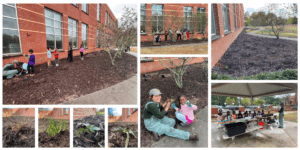
November 7-8, Native planting at Snipes Academy: Page introduced 7 classes (K-5) to 9 different species of native plants that support the life cycles of 26 different moths and butterflies. Students learned about host plants and made connections between landscapes and wildlife presence. 60 students assisted with planting 168 native plants on campus. Project funding provided by Duke Energy and the Women’s Impact Network.
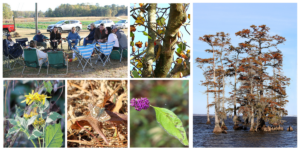
November 9, Spruill Conservation Farm Sensory Nature Walk: NCWF Wildlife Habitat Stewards of Northeastern NC Chapter partnered with Spruill Conservation Farm in Roper to provide a sensory nature walk and bonfire. Participants used their senses to reconnect with nature on this silent hike through hardwood forests, wetlands, and along the Albemarle Sound’s shores observing plants and wildlife along the way.
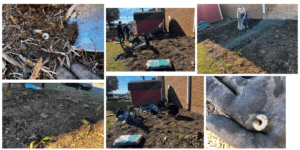
November 9, DWS SABGC Planting Day: NCWF Durham Wildlife Stewards Chapter partnered with the Salvation Army Boys and Girls Club in Durham to plant a native pollinator garden. After two garden prep days, the garden was finally ready to be planted. Twelve young adult volunteers helped plant over 230 native pollinator plants, including purple coneflower, black-eyed susan, aromatic aster, little bluestem, and wild quinine.
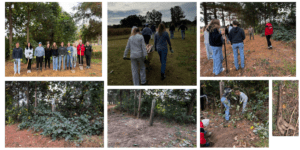
November 10, NCWF Invasive Removal Workday with CNR Ambassadors: NCWF partnered with the Triangle Land Conservancy and NC State’s College of Natural Resources Ambassadors to remove invasive kudzu at Williamson Preserve. The team was able to pull down and dig up lots of kudzu leaves and tubers along the walking path. The group also discovered and tackled a deep network of underground tubers where the kudzu was storing nutrients and allowing the kudzu to spread.
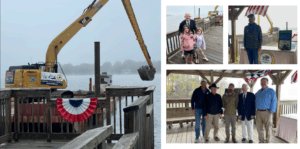
November 11, Patriots Pier Veterans Day Celebration. Natalie and Tim joined NCWF Lake Norman Conservationists Chapter, representatives from the Purple Heart Foundation, and Lancaster Docks for a veterans day celebration and rock reef installation. North Carolina State Governor Jim Martin was present to commemorate this celebration and the future construction of an improved ADA compliant fishing dock to better serve veterans and their families.
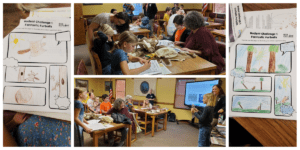
November 12, ecoEXPLORE Mammalogy & Rodent Badges: NCWF, Pocosin Lakes NWR, and Tyrrell County Library teamed up to offer this month’s ecoEXPLORE program introducing two badges that ecoEXPLORErs can earn this season. Participants learned about what makes a mammal a mammal and created their own “fantastic furball” rodent superhero as one of the three challenges needed to earn this season’s Rodent Badge.
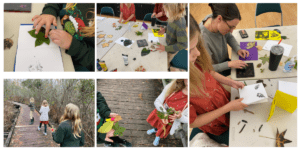
November 13, Nature Journals with Pocosin Arts: NCWF and Pocosin Lakes NWR hosted a nature journal workshop with Pocosin Arts School of Fine Craft. This workshop included an exploratory hike along the Scuppernong River Interpretive Boardwalk trail where participants of all ages collected leaves while working on their plant identification skills. Inside, using ink and rollers, the leaves were printed into each participant’s nature journal.
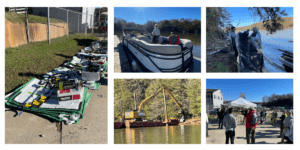
November 16, Hurricane Helene Cleanup NCWF Lake Norman Wildlife Conservationists (LNWC) continued their massive cleanup effort on Lake Norman in response to Hurricane Helene. More than 40 tons of hurricane related debris have been removed from the Catawba River with the help of community partners and dedicated volunteers .
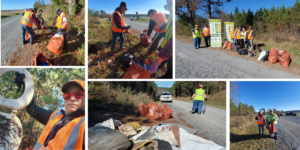
November 16, Fall Litter Sweep: NCWF Union County Wildlife Chapter partnered with NC Forest Service to remove trash and litter accumulated along roadsides near Marshville, NC. Together 10 volunteers removed over 1200 lbs of trash including two box springs, a commode, and even a DVD player. Union County Wildlife looks forward to continuing work with the NC Forest Service to make Union County Clean and Green.
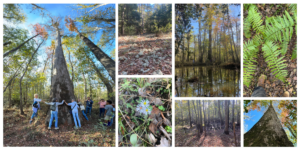
November 17, Ev-Henwood Wildlife Walk: Over 40 people joined the Lower Cape Fear Wildlife and Southeastern Swamp Stewards chapters for Take A Hike day at the Ev-Henwood Nature Preserve. We saw Deer Moss, Asters, and an ancient Bald Cypress estimated to be over 1,000 years old.
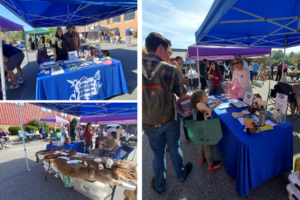
November 17, Wonders of Wildlife Festival: NCWF Concord Wildlife Alliance Chapter participated in the first annual Wonders of Wildlife Festival hosted by Carolina Wildlife Sanctuary at Cabarrus Brewing Company. This family-friendly event was filled with wildlife education, interactive exhibits, live animals, and more. Visitors learned about NCWF’s conservation initiatives including the Butterfly Highway!
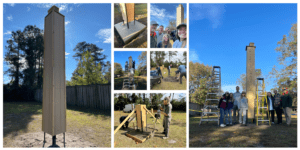
November 18, Chimney Swift Tower Installation at the Friends School of Wilmington: Staff and volunteers from NCWF, FSOW, and Audubon installed a 14’ Chimney Swift tower at the Longleaf Education Center at the Friends School of Wilmington. Project funding provided by Duke Energy and the Women’s Impact Network.
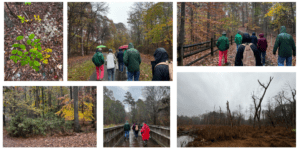
November 20, NRHC Nature Walk at Green Hills County Park: NCWF Neuse River Hawks Conservationists Chapter went on a nature walk from Green Hills Park to Abbott’s Creek Greenway. On this rainy walk led by chapter leaders, we saw large a family of deer, including a few babies that had bedded down. Along the way, chapter leaders pointed out native trees and plants including Devil’s walkingstick, native ferns, and a patch of switch cane. Chapter leaders also discussed the importance of wetlands as the group approached a heronry.
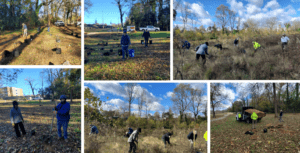
November 22, Creek ReLeaf Tree Prep: NCWF and NCWF Charlotte Wildlife Stewards Chapter assisted Charlotte Mecklenburg Stormwater Services staff with preparation for Charlotte’s annual Creek ReLeaf event. Volunteers unloaded trees and shrubs, moved piles of mulch and compost, and staged trees and shrubs for the big planting. Volunteers even planted several dozen river birch, persimmon, and maple trees to get a head start on the main event!
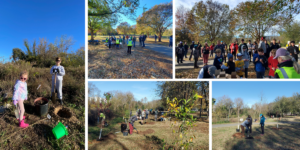
November 23, Creek ReLeaf: Creek ReLeaf is a collaborative effort of the Charlotte Public Tree Fund, Charlotte Mecklenburg Stormwater Services, North Carolina Wildlife Federation, and NCWF Charlotte Wildlife Stewards Chapter (CWS) to plant trees along creeks and greenways in Mecklenburg County. Over 300 hundred trees were planted along Stewart Creek Greenway. This year CWS funded the planting of 45 native pollinator-friendly shrubs!
Written by:

– Page Turner, Conservation Coordinator
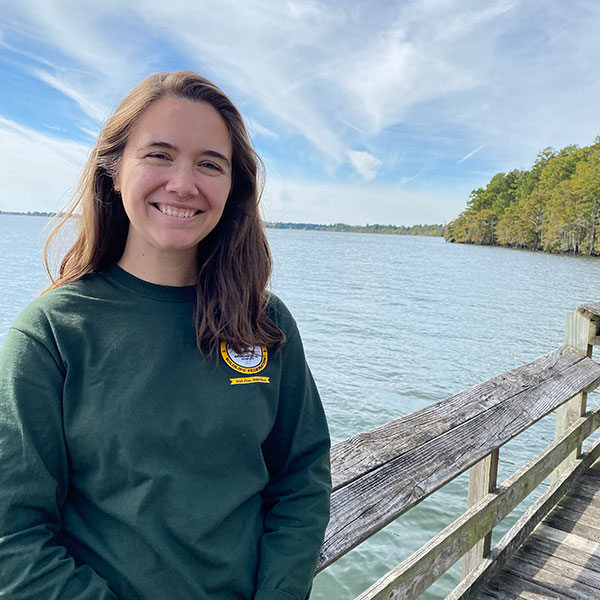
– Laura Frazier, Refuge Conservation Coordinator

– Natalie Bohorquez, VP of Conservation Partnerships
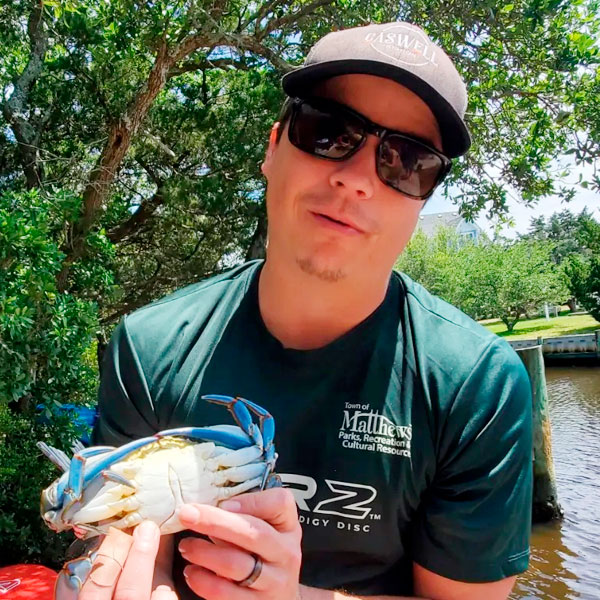
– Alden Picard, Conservation Coordinator

– Kara Solomon, Conservation Coordinator

